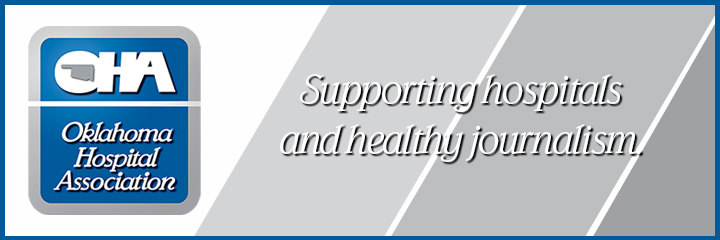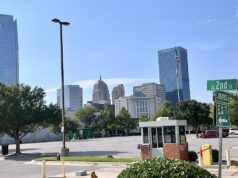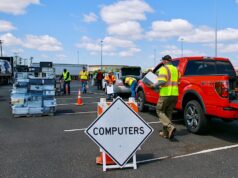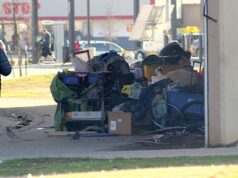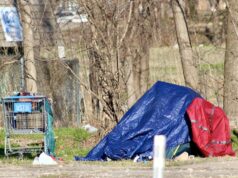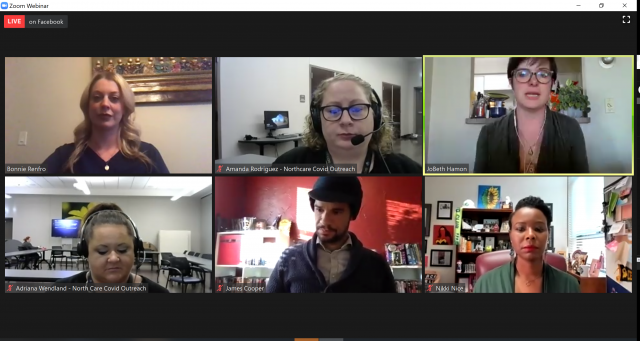

The COVID-19 pandemic is filling hospitals as more and more Oklahomans are being infected every day. And with misinformation continuing to spread, more people could be at risk.
On Tuesday, 2,297 new cases of coronavirus were reported by the Oklahoma State Department of Health, putting the state’s seven-day average over 3,000. Since the virus reached the Sooner State, there have been 1,922 reported deaths.
With a vaccine in sight, Oklahoma City Council members James Cooper of Ward 2, JoBeth Hamon of Ward 6 and Nikki Nice of Ward 7 invited medical and mental health practitioners to a town hall on Tuesday to address the raging pandemic.
The town hall was aimed to regroup and revisit essential facts and provide the public with resources.
“We wanted to provide an opportunity to reintegrate the conversation and make sure we were getting that information out across the city,” Hamon said.
‘Nobody signed up for this’
Bonnie Renfro, a nurse who has been working in COVID ICU units during the pandemic, was one of the guests. She said the virus has been overwhelming for the community and its health care systems and asked members of the public to do what they can to help ease the burden.
Renfro reminded viewers that people needing a COVID test should go to drive-through sites, not emergency rooms. She also encouraged individuals who have recovered from the virus to donate convalescent plasma, which she said is in short supply.
“If you are short of breath, obviously come to the emergency room, but what we’re seeing is a large number of patients waiting in the emergency rooms for (ICU) beds,” Renfro said.
Renfro said that with ventilators in short supply, hospitals are using alternative techniques, such as turning patients onto their stomachs for a length of time to improve oxygenation of their lungs.
“We’re doing this with patients that are sedated and ventilated. And we’re doing this without machines,” Renfro said. “We were maxed out on ventilator settings and we’re maxed out on medication that we give. We have to give these patients everything we can to get these patients’ lungs to improve.”
“Nobody signed up for this, but it is our job as health care workers to serve and protect our community and do what we can to get these people home again,” she added.
Town hall addresses vaccine misinformation
Renfro said she’s concerned that people will become complacent about mask wearing and social distancing when the vaccine arrives.
“We have to realize that the health care system will still have a lot of very sick people,” Renfro said. “And the reality of some of these family situations is that their loved ones are not going to come home.”
Simultaneously, health care professionals are concerned that misinformation will stall the effective distribution of the vaccine.
Chris Harris, chief resident in the Family and Preventive Medicine department of OU Medicine, wanted to quell misconceptions about the virus and urged the community to trust the vaccine.
Harris said one common misconception is that the vaccine carries the virus, like a flu vaccine would. Instead, he explained, the vaccines from Pfizer and Moderna, which were approved by the Food and Drug Administration, contain synthetic mRNA, or genetic information used to make the SARS-CoV-2 spike protein. The spike protein is the part of the virus that attaches to human cells and alone cannot cause COVID-19
“We’ve just got to keep moving forward,” Renfro said. “There will be an end to this eventually.”
Mental health resources
Panelists also discussed the toll the pandemic is taking on people’s mental health and offered resources for those who are struggling.
Amanda Rodriguez, an administrative assistant at NorthCare in Oklahoma City, said the behavioral health center was able to use a FEMA grant given to the Oklahoma Department of Mental Health and Substance Abuse Services to create a crisis hotline.
The hotline can be reached at (405)858-2727 on Monday through Thursday from 8:30 a.m. to 4 p.m. and Friday from 8 a.m. to 2 p.m. The team can also be reached at covidoutreach@northcare.com.
Adriana Wendland, a team lead at NorthCare, said the hotline provides brief crisis counseling. She said anyone can call anonymously during their hours of operation to just talk or even just vent to the team of six members.
NorthCare has largely been offering resources to people who have lost jobs, had hours cut or can’t work because they have to quarantine, Wendland said.
“We’re all here to answer those phone calls to help everyone,” said Wendland, who herself was laid off in March. “We want to help others because we know how it is.”
The team hears a lot of heartbreaking stories, but Rodriguez said they feel thankful for the opportunity to help Oklahomans get through the mental toll of the pandemic.
“It’s amazing to be able to call out in our community and hear that call for help being answered,” Rodriguez said. “As heartbreaking as it is to get these phone calls, it’s amazing to get them resolved.”

